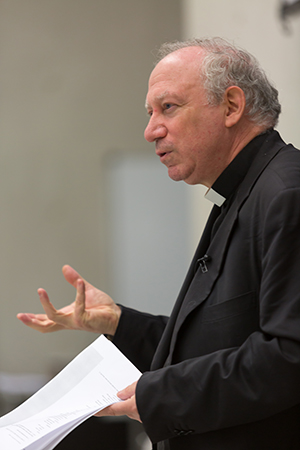Few doubt that possibly the most used term in our language is the word love. On the other hand, there are important areas of life in which it is hardly ever used. In politics, love is not usually spoken of, nor is it in economics. The reason given for this phenomenon is that we are talking about serious things.
"Love could not be placed as a foundation, but only as something decorative within life; it would be irremediably subjective, incapable of giving a solid reason for the construction of a society." Yet, perhaps precisely for this reason, "the great epistemological [scientific knowledge] claim of the encyclical Caritas in veritate Benedict XVI's aim is to show the foundational role of love, with all its affective value, especially with regard to these two social activities, politics and economics. Therefore, he places love as the main light for the understanding of the common good".
"We must help young people overcome the affective illiteracy that prevents them from discovering what love asks of each person."
Juan José Pérez Soba
The person who speaks this way is Juan José Pérez-SobaProfessor at the John Paul II Pontifical Institute for the Sciences of Marriage and the Family (Rome), and keynote speaker at the course on Education of affectivity that has taken place these days in Pamplona, organized by the ICore Curriculum Institute The event was attended by more than 5,000 people from 47 countries.

The main clue to know the contributions of Professor Pérez-Soba has been his book Meeting by the well (Palabra, 2020). In addition, the author's reflections on affectivity are abundant. For example, in the magazine Scripta Theologica of the same year, and in other places. This goes without saying, because you will understand that synthesizing seven sessions of the professor on love and its levels; the types of love; filial, spousal and friendship; love and virtue, affective maturity, and what young people want to know, is practically impossible.
So we will only look at a few topics, anticipating from the outset this wish of the professor: "We must help young people to overcome the affective illiteracy that prevents them from discovering what love asks of each person".
An "egocentric" deception
How could we describe an emotivist, that is, a person who is practically guided by the emotions of the moment? Pope Francis did so in the encyclical Amoris Laetitia (The joy of Love), in the chapter considered the core of the text, the fourth chapter, entitled Love in marriage.
"Desires, feelings, emotions, what the classics called passions, have an important place in marriage [...]". On the other hand, "Jesus, as a true man, lived things with an emotional charge. That is why he was pained by the rejection of Jerusalem, and this situation brought tears to his eyes. He also felt compassion for the suffering of the people. Seeing others weep, he was moved and troubled, and he himself wept at the death of a friend".
However, the Pope goes on to say, "to believe that we are good only because we 'feel things' is a tremendous delusion. There are people who feel capable of great love only because they have a great need for affection, but they do not know how to fight for the happiness of others and live enclosed in their own desires. In that case, feelings distract from great values and hide an egocentrism that does not make it possible to cultivate a healthy and happy family life" (Amoris LaetitiaNo. 145).
At the mercy of emotions
"Emotivism begins with the reduction of affect to emotion," says Professor Pérez-Soba. "In truth, it is the first consequence of considering affectivity exclusively from the introspection of the conscience. In this way, its deepest intentionality and the way of configuring the basis of the moral virtue that leads us to perfection is lost".
Emotion is now called the affection that appears intensely to the conscience and moves it in a concrete direction. It came to replace the term passion, which was more linked to openness to the reception of a gift and to a transcendence, he pointed out in his presentation. In his opinion, it is a consequence of the very secularization that love underwent in the Lutheran interpretation of charity, which explains charity reduced to beneficence, an exchange of useful goods from an altruistic point of view.
"Emotivism begins with the reduction of affect to emotion."
Juan José Pérez Soba
"All this prevented the recognition of its role in marriage, which Luther denies as a sacrament and, for the first time in history, considers it a non-sacramental reality."
Consequently, according to emotivism, a person would be good if he or she feels good when acting in a certain way and this emotion is confused with his or her conscience from an intuitionist viewpoint, explained Professor Pérez-Soba. This reductionism is very clear in the work of Daniel Goleman [Emotional intelligence], which focuses on emotions and their energetic substratum, to the point of losing their intentional meaning.
Mood of the moment
The Directory of the Church's pastoral care of the familypublished by the Spanish Episcopal Conference, and quoted by the professor of the John Paul II Institute, points out that "this conception profoundly weakens man's capacity to construct his own existence because it grants the direction of his life to the mood of the moment, and he becomes incapable of giving a reason for it. This operative primacy of the emotional impulse within man, without any other direction than its own intensity, brings with it a profound fear of the future and of any lasting commitment.
The directory then underlines "the contradiction that a man lives when he is guided only by his blind desires, without seeing their order or the truth of the love that underlies them. This man, emotional in his inner world, on the other hand, is utilitarian with regard to the effective result of his actions, since he is obliged to do so because he lives in a technical and competitive world. It is easy to understand then how difficult it is for him to perceive adequately the morality of interpersonal relationships, because he interprets them exclusively in a sentimental or utilitarian way".
Affective communication of Jesus
"We are not used to analyzing a conversation within the channels of an affective communication, we usually only do so when there is an evident rupture between the interlocutors and we use emotion to explain the failure of the conversation. We often restrict ourselves to verbal language, ignoring the personal content present in an affective way with a very great value in the dialogue. We must consider it a serious shortcoming to remain at this conscious level of analysis that tends to reflection, and instead lose the affective dynamism that guides it".
This is how Professor Juan José Pérez Soba begins his analysis of Jesus' conversation with the Samaritan woman at the well of Sychar. "A woman from Samaria came to draw water, and Jesus said to her, 'Give me a drink'" (Jn 4:7).
"We can take it as an example of an evangelizing conversation that has the amazing result of the complete transformation of the woman who becomes an apostle for her fellow citizens of Sychar. Thus we take her as a prototypical reference for pastoral action in the family setting."
In fact, the Apostolic Exhortation Amoris Laetitia presents this encounter as a key point of his exposition. Pope Francis says: "This is what Jesus did with the Samaritan woman (cf. Jn 4:1-26): he addressed a word to her desire for true love, to free her from all that was obscuring her life and lead her to the full joy of the Gospel" (no. 294).
Affections do not exclude objectivity
Undoubtedly, the professor explains, we are heirs of a rationalistic apologetics where the evangelizing role would consist in demonstrating by means of conclusive reasons the 'praeambula fidei' to a person who resists believing, but who is capable of reasoning.
The inadequacy of this path is the basis of the proposal of St. John Henry Newman, for whom an adherence of faith must involve the whole person, not just his intelligence.
Benedict XVI, in his first encyclical, took the path of desire in a clear way by considering that "the best defense of God and man consists precisely in love," recalls Pérez-Soba, since the dialogue with the Samaritan woman "is eminently affective. The thirst of which Christ speaks is, as St. Augustine affirms, of the faith of the Samaritan woman. It is thus framed within its own framework, faith in a love that is the internal logic of the whole story.
In the opinion of the professor of the John Paul II Institute, "this leads us to consider that speaking of the affections does not in any way exclude objectivity, but rather demands it in its own way and, in fact, sustains this conversation. Desires are not intimate, they are not enclosed in self-referentiality, they are the basis of a communication with a clear objective value that enriches when shared. The denial of this principle has greatly complicated any affective dialogue, because the prejudice has been projected on it that it would always be a subjectivist intimacy to which we should object".
"This is not so in the classical tradition, which has preferred the framework of dialogue to that of introspection in order to be able to speak of the affections". Let us recall, Pérez-Soba adds, "the brilliant opening of the book De spiritali amicitia of Alfred of Rieval in the twelfth century: 'Here are you and I, and I hope that as a third between us is Christ".
The inclusion of Christ as present in the friendship itself is not an add-on, but the reason for the conversation, Pérez-Soba stresses. That is why the English monk insists on the advice to include this way of thinking in all areas of life: "Speak confidently and with the friend mix all your concerns and thoughts, whether you learn something or teach it, give it or receive it, deepen it or draw it out."
Personal meeting
This reflection of the professor would be even more incomplete if it did not include at least the following. "Jesus, starting from the truth of desire, takes advantage of the initial astonishment shown by the woman and takes the new logic of the revelation of the person in love, the intention that guides him is to show the beloved as an end in himself. He wants us to be able to truly say 'I love you for who you are'".
"In the case of God, we must speak of an original love, at the same time unconditional and exclusive, which heals the heart of man and enters into human relationships".
Juan José Pérez Soba
And at that point the conversation changes because it becomes personal and is inserted in the construction of one's own real life. "The well of thirst and effort will be revealed, through a personal encounter, as the source of the gift and of the covenant. God's promise follows the dynamic of a love that grows and allows to explain the unity of life manifested to men in a horizon of salvation", adds the professor.
"In the case of God, as a revelation of the radical newness that introduces his action in the world, we find ourselves before the offering of his covenant. We must speak of an original love, at the same time unconditional and exclusive, which heals the heart of man and introduces itself into human relationships".
"Its proper understanding implies a total, exclusive, corporal and fruitful love: God, the Bridegroom, obtains the fidelity of his bride Israel to a Covenant that is forever and that will be the center of the Christian mystery" (cf. Eph 5:32).
These characteristics mark, in the opinion of Pérez-Soba, the revelation of God in his most personal value, to the point that Benedict XVI could say: "To the image of the monotheistic God corresponds monogamous marriage. Marriage based on an exclusive and definitive love becomes the icon of God's relationship with his people and, vice versa, God's way of loving becomes the measure of human love".
"The truth of a personal love that calls us, in which the involvement of the person in affection is realized, is the beginning of a delicate process of growth that must be cared for and accompanied," adds the speaker." It is a maturation process that is already noted in the Song of Songs as a response to the call of love: the voice of my Beloved (Song 2:8).
Educating young people in affection
"We must take seriously the help that young people need to learn to love". Professor Pérez-Soba recalls Pope Francis here when he says: "But who speaks of these things today? Who is capable of taking young people seriously? Who helps them to prepare seriously for a great and generous love?"
"Avoiding affective education generates a void in young people that makes it difficult for them to find the meaning of what they are experiencing".
Juan José Pérez Soba
If one understands the great richness of being able to interpret the affections from that love that promises a story, the fact of learning to love becomes urgent and is appreciated, says the professor, who adds that affections must play a central role in the formation of young people. "Education has to be an education first and foremost in the affections; and obviating it generates a void in young people that makes it difficult for them to find the meaning of what they are living," he said in the course.
Incidentally, Pérez-Soba alluded to the commentary on Origen's "Song of Songs," and commented that this biblical book is never read in the liturgy, when it is one of the most commented on by the Fathers of the Church. "It is as if there is a fear of affection," he pointed out.
To the measure of Christ
"The emotional subject is currently the greatest difficulty for evangelization," the speaker considered. "The reason for this is that he considers religious experience according to the intensity of his feeling. Therefore, he does not go to Mass if he does not feel it, he does not pray if he does not find emotions, the doctrine seems to him totally alien to life because it does not awaken any feeling in him and it bores him. This is the cause of the success of New Age spirituality, of a religiosity of pure emotional consumption".

The objective of the Church's pastoral care, according to Juan José Pérez Soba, "consists to a great extent in converting the emotional subject into a Christian subject: 'to the measure of Christ' (cf. Eph 4:13) who lives from the love of Christ that makes him a son, and not from the emotion of the instant that does not know where it leads him. This is the step of conversion, to which our dialogue with the Samaritan woman is a unique testimony".
The course was also attended by Jokin de Irala, professor at the Faculty of Medicine of the University of Navarra and researcher, and Nieves González Rico, academic director of the Instituto Desarrollo y Persona of the Francisco de Vitoria University. Their interventions, basically focused on affectivity and sexuality, will be dealt with in the near future.








